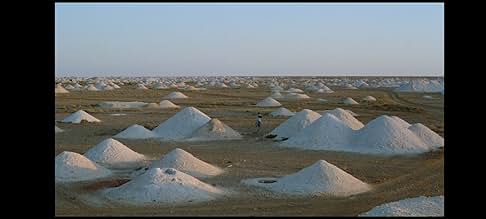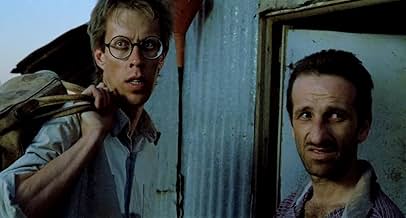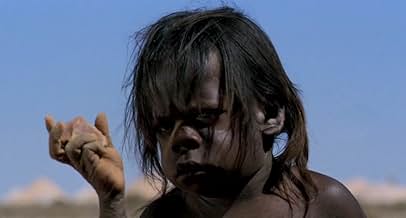CALIFICACIÓN DE IMDb
6.9/10
2.7 k
TU CALIFICACIÓN
Un geólogo contratado por una compañía minera australiana se ve envuelto en una disputa por los derechos de la tierra sagrada de unos aborígenes.Un geólogo contratado por una compañía minera australiana se ve envuelto en una disputa por los derechos de la tierra sagrada de unos aborígenes.Un geólogo contratado por una compañía minera australiana se ve envuelto en una disputa por los derechos de la tierra sagrada de unos aborígenes.
- Premios
- 2 premios ganados y 2 nominaciones en total
- Dirección
- Guionistas
- Todo el elenco y el equipo
- Producción, taquilla y más en IMDbPro
Argumento
¿Sabías que…?
- TriviaThe whole story of the green ants was made up by Werner Herzog, it's not a part of genuine Aboriginal folklore. However the courtroom incident where a secret artifact is revealed, to the bemusement of the judge, is based on a real incident.
- Citas
Lance Hackett: The situation, your Honor, is this man is the the sacred custodian to the secrets of this tribe. And his tribe has died out. He is the sole and final survivor of his people, his clan. They call him the mute, because there is nobody left on this earth for him to speak with.
- Bandas sonorasRequiem Op. 48
Music by Gabriel Fauré
Opinión destacada
Herzog is a simple man, easy to read. Hearing him talk of his films, one gets bored easily.
His films are simply conceived, like Lynch's, but once he gets rolling, his intuitions take him to strange, exotic corners of the soul. There he leaves traces that last. I love the man's work, much of it. I love the fact that he really seems to be driven by urges that seem to accidentally result in something that can cross the distribution divide to reach me. This is no small feat; the films I watch that have ideas and matter are what maybe a millionth, a billionth? of the similarly deep insights and artifacts that would have similar effect in me, but which cannot cross that divide.
When I watch his work, some of which I reserve for the future, it is a dip into the film of Herzog. Failures add to this. Risks that did not pan out for him, do for me.
This film has some heavy disadvantages. He is in Australia and he simply does not understand that to photograph the land the way it affects its inhabitants, you have to photograph nothing. Nothing is what matters. But he gives us a tornado. Its beautiful and violent it even fits the story. He gives us unrelenting piles of boring waste. This too is effective in the film, but not of the place.
He misses both the place and he people. He does give us beautiful Aboriginal faces. He does celebrate them. But its from a deeply disturbing patriarchal, colonial perspective. There is some of this in his Peruvian adventures, but it is hidden in his respect for the Jungle. The natives are simply part of the terrain. He cannot do that here. This also suffers in that he felt it necessary to have an on-screen observer who "learns" the value of the place and turns from heading the mining effort to living with the people.
The result is that the film is overt in its sentiments, but everything works against its honesty. We are left with having to accept it locally, each scene as a sort of standalone taste: black patient faces staring out of pilot seats in an airplane given to them; a man on a witness stand testifying in a language no other soul on the planet understands; an old biddy waiting in the sun at a mine opening on the of chance that her beloved doggie will reappear; that tornado; the (overearnest) story of the sleeping green ants whose dreams we are.
This has value in those small pieces, pretty much throughout. But in the large, taken the way he intends it, its just a colonial German peering into a quaint culture as an ordinary tourist would. So it dilutes the greater story, the greater film of the man.
Ted's Evaluation -- 2 of 3: Has some interesting elements.
His films are simply conceived, like Lynch's, but once he gets rolling, his intuitions take him to strange, exotic corners of the soul. There he leaves traces that last. I love the man's work, much of it. I love the fact that he really seems to be driven by urges that seem to accidentally result in something that can cross the distribution divide to reach me. This is no small feat; the films I watch that have ideas and matter are what maybe a millionth, a billionth? of the similarly deep insights and artifacts that would have similar effect in me, but which cannot cross that divide.
When I watch his work, some of which I reserve for the future, it is a dip into the film of Herzog. Failures add to this. Risks that did not pan out for him, do for me.
This film has some heavy disadvantages. He is in Australia and he simply does not understand that to photograph the land the way it affects its inhabitants, you have to photograph nothing. Nothing is what matters. But he gives us a tornado. Its beautiful and violent it even fits the story. He gives us unrelenting piles of boring waste. This too is effective in the film, but not of the place.
He misses both the place and he people. He does give us beautiful Aboriginal faces. He does celebrate them. But its from a deeply disturbing patriarchal, colonial perspective. There is some of this in his Peruvian adventures, but it is hidden in his respect for the Jungle. The natives are simply part of the terrain. He cannot do that here. This also suffers in that he felt it necessary to have an on-screen observer who "learns" the value of the place and turns from heading the mining effort to living with the people.
The result is that the film is overt in its sentiments, but everything works against its honesty. We are left with having to accept it locally, each scene as a sort of standalone taste: black patient faces staring out of pilot seats in an airplane given to them; a man on a witness stand testifying in a language no other soul on the planet understands; an old biddy waiting in the sun at a mine opening on the of chance that her beloved doggie will reappear; that tornado; the (overearnest) story of the sleeping green ants whose dreams we are.
This has value in those small pieces, pretty much throughout. But in the large, taken the way he intends it, its just a colonial German peering into a quaint culture as an ordinary tourist would. So it dilutes the greater story, the greater film of the man.
Ted's Evaluation -- 2 of 3: Has some interesting elements.
- tedg
- 19 dic 2008
- Enlace permanente
Selecciones populares
Inicia sesión para calificar y agrega a la lista de videos para obtener recomendaciones personalizadas
- How long is Where the Green Ants Dream?Con tecnología de Alexa
Detalles
- Fecha de lanzamiento
- País de origen
- Idioma
- También se conoce como
- Where the Green Ants Dream
- Locaciones de filmación
- Productoras
- Ver más créditos de la compañía en IMDbPro
- Tiempo de ejecución1 hora 40 minutos
- Mezcla de sonido
- Relación de aspecto
- 1.85 : 1
Contribuir a esta página
Sugiere una edición o agrega el contenido que falta

Principales brechas de datos
What is the Spanish language plot outline for Donde sueñan las hormigas verdes (1984)?
Responda





























